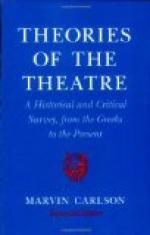Throughout the present discussion, I have insisted on the point that the great dramatists have always written primarily for the many. Yet now I must add that when once they have fulfilled this prime necessity, they may also write secondarily for the few. And the very greatest have always done so. In so far as he was a dramatist, Shakespeare wrote for the crowd; in so far as he was a lyric poet, he wrote for himself; and in so far as he was a sage and a stylist, he wrote for the individual. In making sure of his appeal to the many, he earned the right to appeal to the few. At the thirty-cent performance of Othello that I spoke of, I was probably the only person present who failed to submerge his individuality beneath the common consciousness of the audience. Shakespeare made a play that could appeal to the rabble of that middle-western town; but he wrote it in a verse that none of them could hear:—
Not
poppy, nor mandragora,
Nor all the drowsy syrups
of the world,
Shall ever medicine thee to
that sweet sleep
Which thou ow’dst yesterday.
The greatest dramatist of all, in writing for the crowd, did not neglect the individual.
III
THE ACTOR AND THE DRAMATIST
We have already agreed that the dramatist works ever under the sway of three influences which are not felt by exclusively literary artists like the poet and the novelist. The physical conditions of the theatre in any age affect to a great extent the form and structure of the drama; the conscious or unconscious demands of the audience, as we have observed in the preceding chapter, determine for the dramatist the themes he shall portray; and the range or restrictions of his actors have an immediate effect upon the dramatist’s great task of character-creation. In fact, so potent is the influence of the actor upon the dramatist that the latter, in creating character, goes to work very differently from his literary fellow-artists,—the novelist, the story-writer, or the poet. Great characters in non-dramatic fiction have often resulted from abstract imagining, without direct reference to any actual person: Don Quixote, Tito Melema, Leatherstocking, sprang full-grown from their creators’ minds and struck the world as strange and new. But the greatest characters in the drama have almost always taken on the physical, and to a great extent the mental, characteristics of certain great actors for whom they have been fashioned. Cyrano is not merely Cyrano, but also Coquelin; Mascarille is not merely Mascarille, but also Moliere; Hamlet is not merely Hamlet, but also Richard Burbage. Closet-students of the plays of Sophocles may miss a point or two if they fail to consider that the dramatist prepared the part of Oedipus in three successive dramas for a certain star-performer on the stage of Dionysus. The greatest dramatists have built their plays not




